Apertures, March/April edition, no. 14
shaking hands with the poet; spring's last word; the dissimilar silences of Small Things Like These; Spirit, in the words of Mary Oliver; my poem on mustard seeds; + favorites, & 5 songs.
Welcome to Apertures. A monthly letter collecting themes of grace from short essays, poetry, music, movies, news and photographs. All pictures taken by me unless otherwise noted.
*Hello friends, it’s been awhile. January was our last Apertures, and I tried some new things in the meantime but I’ve found myself back here again, gathering apertures of grace for you. Spring has officially arrived. Let’s see what we’ve got. Thank you for being here.
1. How to Survive Being a Poet/How to Survive Being Around a Poet
by Andy Squyres
If you are a poet it is likely that you live among those who are not. If you are a poet do not be surprised to find yourself surrounded by those who do not write poetry or who do not appreciate it for that matter. You (the poet) and your friends (the non-poets) will be constantly internally asking the question “How do they live with themself?” Expect enough tension between you to keep the relationship interesting.
As a poet among non-poets you should be aware that you are the village idiot and what is clear to everybody else is probably not clear to you: despite what you’ve assumed, the smartest person in the room is never you. Overestimating your intellectual power is a common mistake made by most poets. You may be in touch with your feelings and you may know how to brilliantly describe a cloudy day but other people know ACTUAL things. If in a conversation with a civil engineer or software developer you happen to mention “I was reading Czesław Miłosz the other day…” you will invariably be met with cold analytical stares and blank silence, which you will completely deserve.
Your darkest moment will come when you are at a backyard bbq full of electricians and plumbers and nurses and accountants, them with Coronas in their hands and hot dogs on the grill and you’ll take it as an opportunity to subject everyone to the phrase “last bastion of subversive hope” during your diatribe against the evils of Utilitarianism. You will not recover from this moment and neither will anyone else. Some will pray that maybe eventually you’ll come to Jesus. Others will permanently avoid you. But the worst part will be that your best friends will just humor you, pat you on the shoulder and secretly hope that someday you’ll get a job.
Fortunately though, the apprehension felt by each of us in this story is a feature not a flaw. The poet will on rare occasion offer words that reveal meaning about our lives that sometimes seem to be overwhelmed with meaninglessness. The non-poet reciprocates by providing all the math which accounts for the chair and air-conditioning needed so that the poet can type on the laptop in order to provide infrequent bread crumbs of wonder.
Andy, how do you do it? You’re a poet so we’ll never know how. But I will happily be served up a delicious and infrequent plate of bread crumbs in the name of wonder anytime.
My husband tells me that I’m into my forties now that I’m forty-two. I can feel things settling within me. There’s an arrival that’s been happening within me over the last few years. As if to say, oh there you are! Let us shake hands in agreement.
I’m a poet. Shake.
I will learn that my voice has value (thus silencing that nagging opposing voice all the more), by saying what I want to say out loud and sticking around long enough to find out what happens. Shake.
I am never not interested in how God ties into all things. Shake.
I’m a sucker for the classic American novel. Shake.
I need wide berths of solitude and silence to know what I want. Shake.
I care deeply for the leaders in our churches. Shake.
I am always tempted by Acedia and the desire to do more. I must treat these things as temptations that are against my good. Shake.
There are more, but what Andy’s poem made me think about were all the things that I’ve known to be true, but didn’t really know why. I’m back in community college taking Geology 101 and sifting through the sand and rocks that are me.
That’s me. That’s not me. I’ve never been one to know what I want straight out of the gate. But now? Now. I’ve got a few big rocks sitting on top of that sifter staring back at me saying, see I told you.
So here’s to all you poets out there. We may not be the smartest in the room, and we may be really awkward at small talk, and we might rather be penning words to feelings instead of figuring out actual facts, BUT what is it to us to gain the whole world and lose our souls?
2. What if Spring had the last word?
With a little help from Robert Farrar Capon & T.S. Eliot
by Janell Downing
Spring is back at it outside my front window.
I was chatting with friends yesterday about what is giving us hope these days and it struck me that it all had to do with some form of new life. Life still there. Life transplanting from one place to the next (please be gentle with the roots), life resuscitated from the aid of others breath, and i thought is this not always available to us?
Spring reminds me of youth. The young, tender green and vibrancy and naiveté of young love. Yet outside my window, Spring arrives again and again with her arrival of youth in my midlife.
I'm further on in the journey now, and maybe you are too, but here's something I'm pondering (thank you Robert Farrar Capon1): what if Spring has the last word?
What if in that last Word was not an anvil but a tender green shoot full of naïve love? The way it was always meant to be?
T.S. Eliot usually has something to say about these matters so I'll leave you with his thoughts from Little Gidding2:
“We shall not cease from exploration
And the end of all our exploring
Will be to arrive where we started
And know the place for the first time.
Through the unknown, remembered gate
When the last of earth left to discover
Is that which was the beginning;
At the source of the longest river
The voice of the hidden waterfall
And the children in the apple-tree
Not known, because not looked for
But heard, half-heard, in the stillness
Between two waves of the sea.”
3. When the silence of trauma collides
reflections, after reading and watching Small Things Like These
Last night I had the evening to myself so I sat down to watch a movie that’s been on my list for a while: Small Things Like These. Adapted from Claire Keegan’s slim novel published in 2021, which I had read over Christmas a couple years ago, the film stays true to the story of the Magdalene Laundries. At the end of the film, we see that it is dedicated to “more than 56,000 young women who were sent to Magdalene institutions for ‘penance and rehabilitation’ between the years 1922 and 1998. And the children who were taken from them.”
If you haven’t read the book or watched the movie, you should stop reading now. Spoilers ahead.
I couldn’t help but notice the contrast between the silence of the Church and the silence of Bill Furlong, our story’s protagonist, endearingly played by Cillian Murphy.
One silence takes the hand of God and systemically muffles the cries of women and their children in the name of holiness and justice. (Is that really the hand of God they are holding?) The other silence rises up with fortitude, without much to say. It’s like when you open the door, to a better version of yourself, and you just stand there, staring at each other. Bill Furlong’s childhood story comes to the front of his mind when he witnesses how the nuns treat the pregnant women. And from then on, we watch him withdraw into his memories, now standing face to face with what he witnessed. He’s at a threshold. In silence, he scrubs his hands from his day’s work, contemplating what to do with what he’s seen. In silence he eats his dinner, even when his wife brings up how quiet he’s been lately. I found myself wanting him to tell her, to make a case for the “right thing to do,” but when you find out that the Devil has his authoritarian and manipulative fingers in all of the pies, there’s a long way down if you speak up and spread the word.
The inner fire that ignites in Bill Furlong could very well be the hand of God that moves him to compassion and action. It’s quiet, wild and strong. Not unlike the burning bush that He summoned Moses with. All thinking and reasoning and planning have gone out the window. There’s just as much humility and holiness on that ground, as when Bill walks hand in hand with the girl, out of her captivity and into an unknown freedom - for both of them.
“We’ve not far to go now,” Furlong assured. “We’re almost home.”
As they carried on along and met more people Furlong did and did not know, he found himself asking was there any point in being alive without helping one another? Was it possible to carry on along through all the years, the decades, through an entire life, without once being brave enough to go against what was there and yet call yourself a Christian, and face yourself in the mirror?
How light and tall he almost felt walking along with this girl at his side and some fresh, new, unrecongisable joy in his heart. Was it possible that the best bit of him was shining forth, and surfacing? Some part of him, whatever it could be called - was there any name for it? - was going wild, he knew. The fact was that he would pay for it but never once in his whole and unremarkable life had he known a happiness akin to this, not even when his infant girls were first placed in his arms and he had heard their healthy, obstinate cries.
He thought of Mrs. Wilson, of her daily kindnesses, of how she had corrected and encouraged him, of the small things she had said and done and had refused to do and say and what she must have known, the things which, when added up, amounted to a life. Had it not been for her, his mother might very well have wound up in that place. In an earlier time, it could have been his own mother he was saving - if saving was what this could be called. And only God knew what would have happened to him, where he might have ended up.
The worst was yet to come, he knew. Already he could feel a world of trouble waiting for him behind the next door, but the worst that could have happened was also already behind him; the thing not done, which could have been - which he would have had to live with for the rest of his life. Whatever suffering he was now to meet was a long way from what the girl at his side had already endured, and might yet surpass. Climbing the street towards his own front door with the barefooted girl and the box of shoes, his fear more than outweighed every other feeling but in his foolish heart he not only hoped but legitimately believed that they would manage.3
Do not fool yourself. If anyone thinks he knows a lot about the things of this world, he had better become a fool. Then he may become wise. - 1 Corinthians 3:18
4. Poem
by Mary Oliver
The spirit likes to dress up like this:
ten fingers,
ten toes,
shoulders, and all the rest
at night
in the black branches,
in the morning
in the blue branches
of the world.
It could float, of course,
but would rather
plumb rough matter.
Airy and shapeless thing,
it needs
the metaphor of the body,
lime and appetite,
the oceanic fluids;
it needs the body’s world,
instinct
and imagination
and the dark hug of time,
sweetness
and tangibility,
***
to be understood,
to be more than pure light
that burns
where no one is —
so it enters us —
in the morning
shines from brute comfort
like a stitch of lightning;
and at night
lights up the deep and wondrous
drownings of the body
like a star.4
5. Mustard Seeds: A Sleight of Hand
by Janell Downing
In March, Mockingbird published this poem of mine, but I thought in case you missed it, I’ll share it with you here, too.
I went to the market to buy mustard seeds. I needed more for preserving and had no intention of planting such an invasive species.
There were many as I scooped my hand into the basket.
Rough, tiny and dry, I plunged and poured them into my basket tucked against my body.
Shirt stuck against my skin as the heat pricked my pores.
Turning, I bumped into a man whose brown eyes bore resemblance to someone I thought I knew.
There were woops and hollers as goods and monies exchanged hands
sweaty as the sun bore it’s rays through the open windows.
The air was thick with scents of cardamom, roses and fish.
Money in my hand, I turned from the brown eyes of the man I thought I knew
to give the supplier his due amount.
With a sleight of hand, my money and seeds fell to the dirt as the man with the brown eyes flipped the table in front of me with one hand
his other — an outstretched arm against my chest.
He said something to the man selling mustard seeds, but I didn’t quite catch it because I was so consumed with saving what I came for.
I never went back after that happened. For some reason, the authorities were angry with this man with the brown eyes. Now that I think of it, his eyes were angry and sad too. A color too deep for words.
The authorities ended up killing him.
(I guess for flipping the tables and causing a scene? I’m not sure)
They sure made quite the scene with his death though.
I tried not to get too involved.
Rumor has it he came back to life
which would be quite the scene.
I walked by where the temple used to be
(it was destroyed in the war)
and you wouldn’t believe what’s popping up through the rubble.
A thousand little resurrections.
This seed was never meant to be preserved. It seems that it grows where it pleases —
invasive, creative and a bother to some. It’s runners run under and climb over walls.
And just the other day I thought I saw the Man with the brown eyes resting under one of its trees
free of charge.
I’d been playing around with the idea of the Kingdom of God being like a mustard seed. Poetry is good for me to write because it involves play and not knowing where it will go. I had no idea I would end up in the temple where merchants are using the House of God (prayer) for profit. When I hear that story of Jesus flipping tables I usually try to align myself with Him. And especially these days, a lot of people would like to use Him to flip tables.
But I wasn’t Him. I was there because it had been the place I’d always gone to to buy what I needed. And I happened to be there when He came upon the scene after Palm Sunday. In this exchange I felt His mercy, and a sense of childlike innocence. I didn’t know!
I’ve thought about it a lot since then, and I sense that Jesus also wants me to know that I did nothing wrong. Sometimes, we are left with the aftermath of Jesus flipping tables in our own hearts, and the hearts of those we love, and we want to say, I’m so sorry! I didn’t mean to. Consolation and grace can absolutely be a disturbance. A disturbance for the better, but still, it’s a real mess. I think He’d rather meet us in the mess, than an exchange.
6. “Tenderness, is in a way, an expression of the refusal to judge.”
John Berger
7. The Kingdom
by R.S. Thomas
“It’s a long way off but inside it
There are quite different things going on:
Festivals at which the poor man
Is king and the consumptive is
Healed; mirrors in which the blind look
At themselves and love looks at them
Back; and industry is for mending
The bent bones and the minds fractured
By life. It’s a long way off, but to get
There takes no time and admission
Is free, if you will purge yourself
Of desire, and present yourself with
Your need only and the simple offering
Of your faith, green as a leaf.”5
Some Favorites from March & April
Shawn and Maile Smucker of
bookshop, have a delightful podcast about owning and running a bookstore. Listen here: So, We Bought a Bookshop.This poem about Joseph of Arimathea on Good Friday, by Jessie Epstein, over on
.This essay in praise of unruly children at church
If you’re in the mood for something quiet and delightful, this korean film made me smile
Author
and the intuitive sense of liberty
5 Songs Worth Repeating
Fly Like a Bird, Sing Sing Original Soundtrack
Anyone Else, John Mark McMillan
Give Me Mercy, The Weeknd
Time Waited, My Morning Jacket
Hide and Seek - Triple J like A version, Ball Park Music
Grace & Peace to you all,
Janell
At the turn of every season, I read the appropriate chapter in Capon’s book, The Youngest Day: Shelter Island’s Seasons in the Light of Grace
Little Gidding is the last of four poems included in T.S. Eliot’s collection of the Four Quartets.
Keegan, Claire. (2021). Small Things Like These. Grove Press, New York.
Oliver, Mary. (2017). Devotions: The Selected Poems of Mary Oliver. Penguin Books.
Thomas, R.S. (1993). Collected Poems, 1945-1990. Phoenix, The Orion Publishing Group.





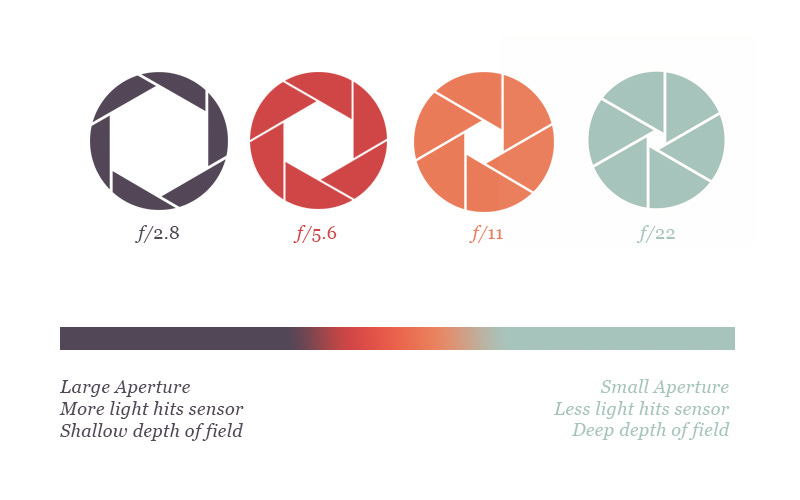
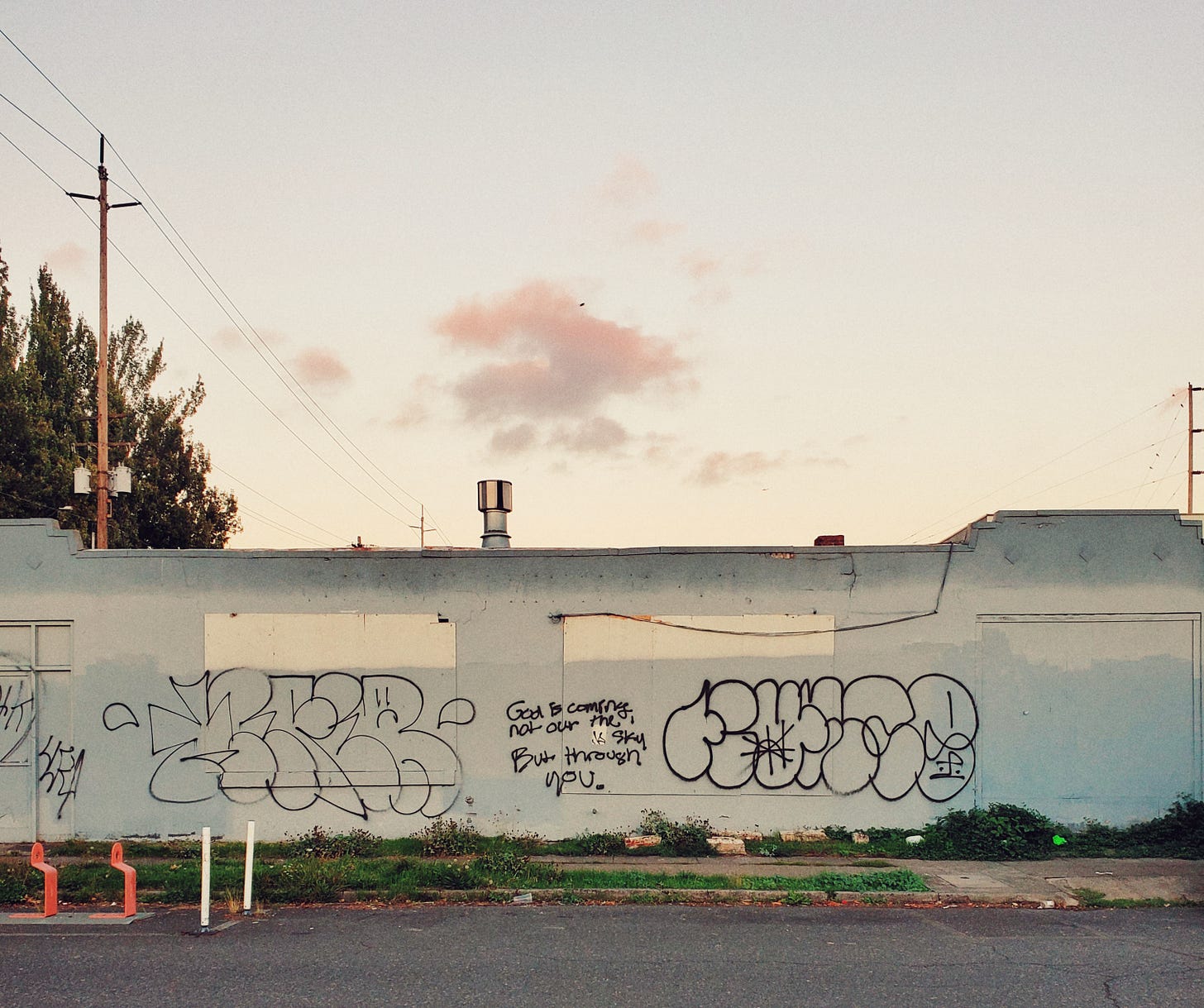
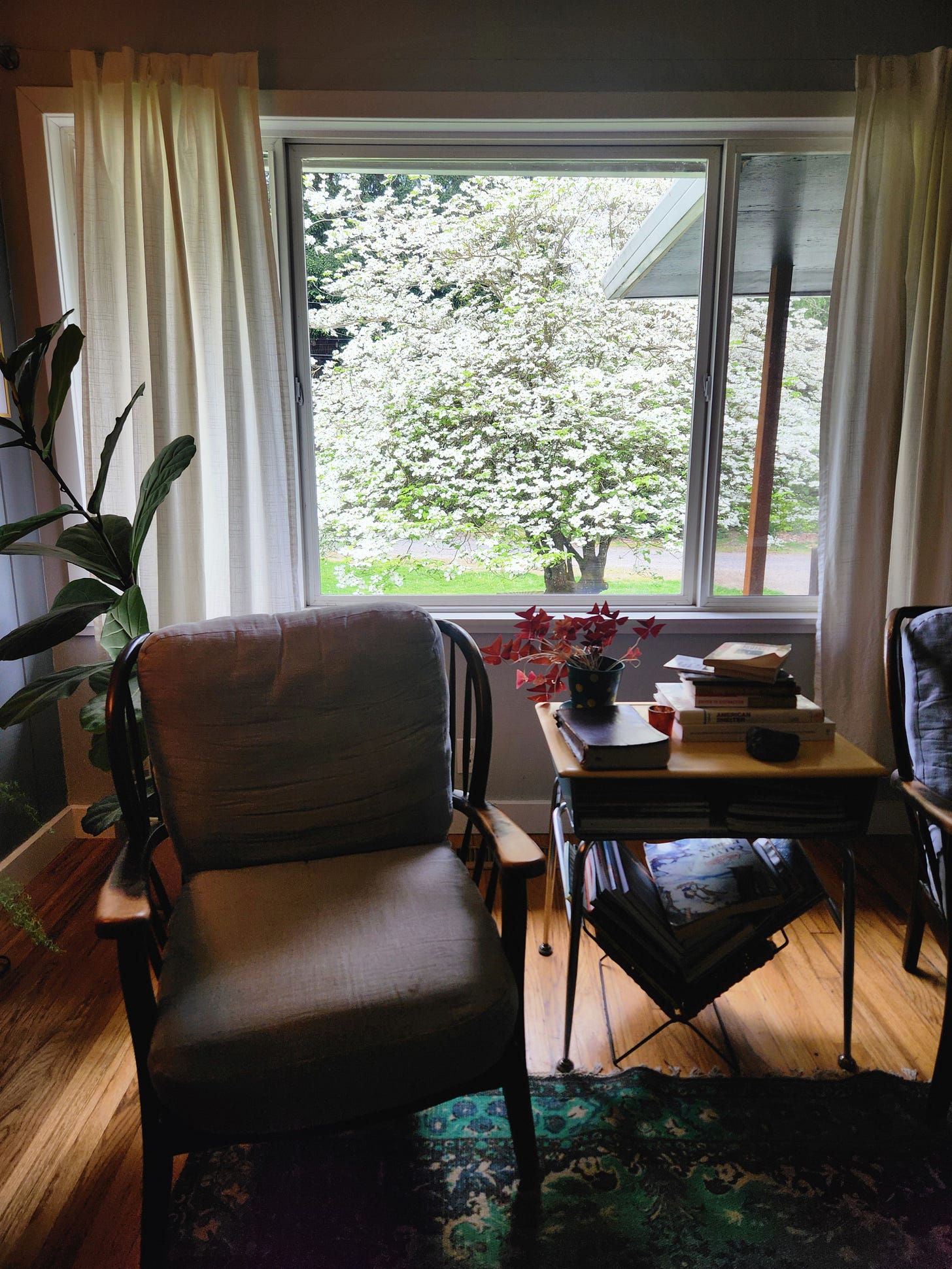
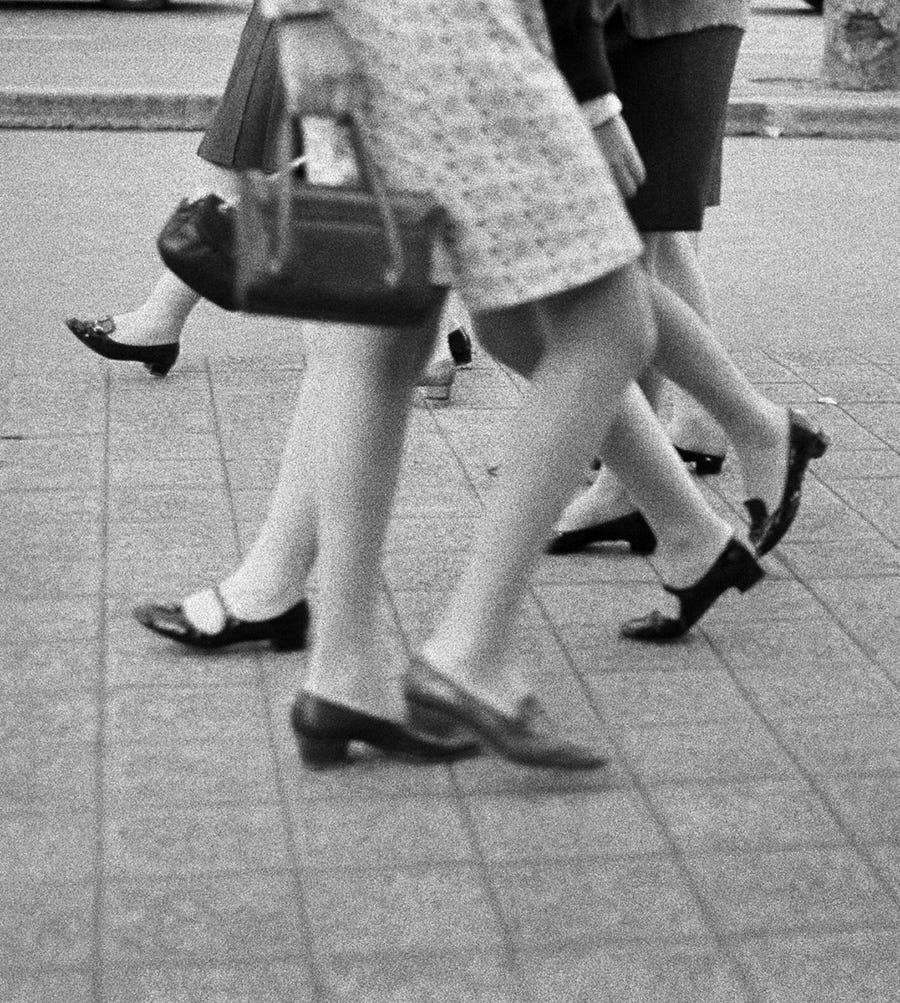
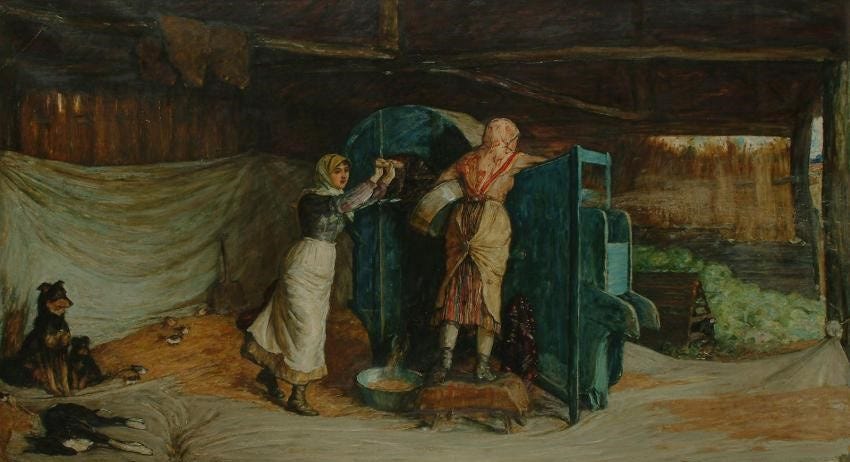
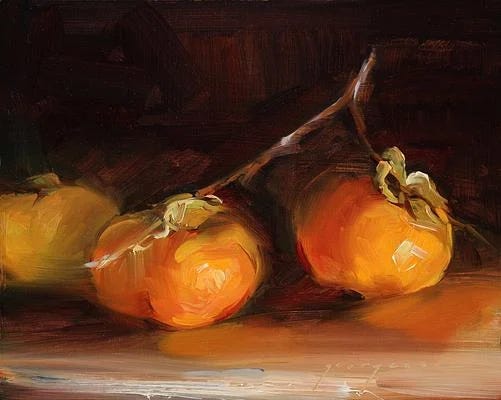
These emails always make me wish we could sit down over a delicious beverage and chat about life.
Thanks for the mention, Janell!